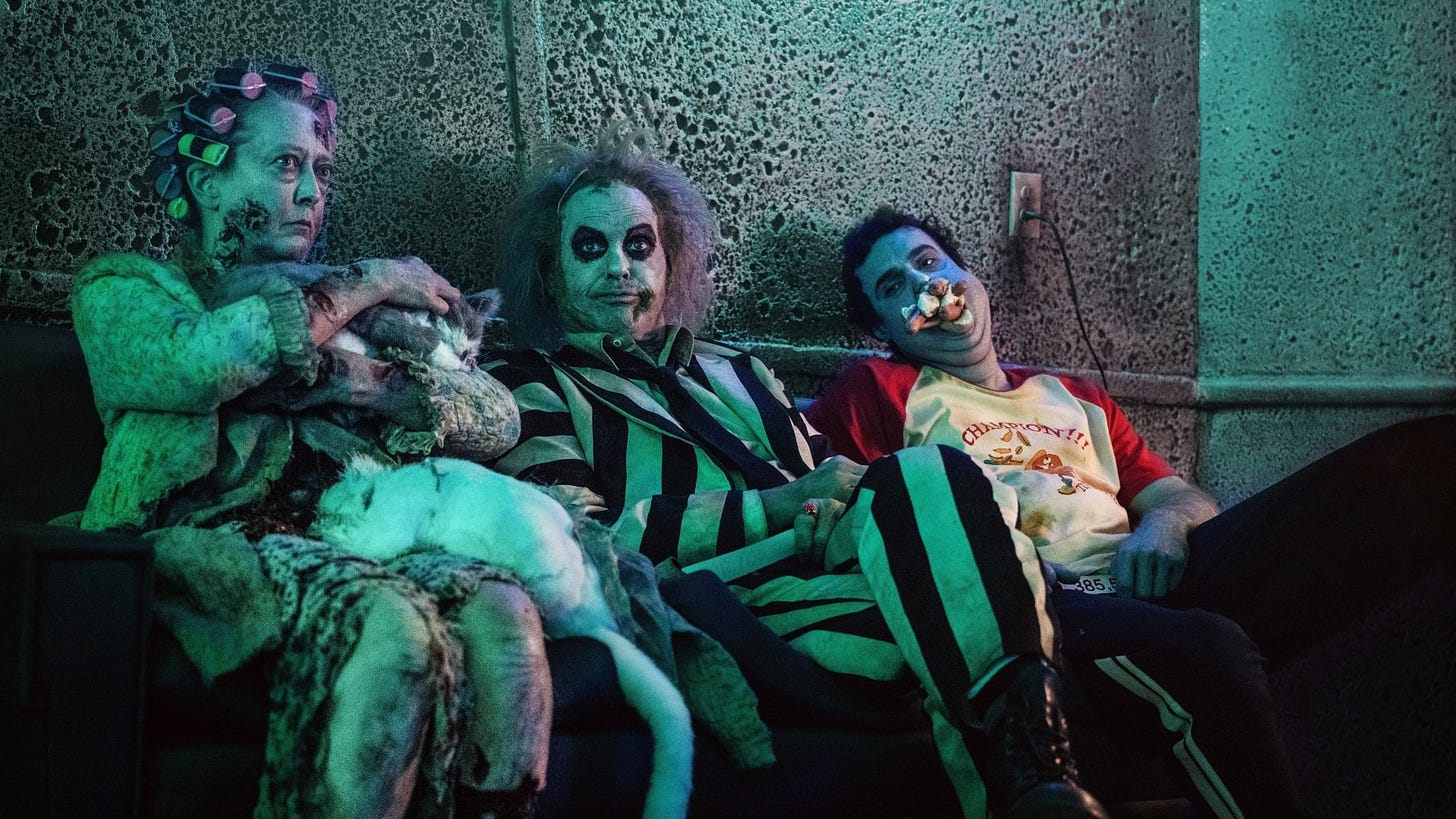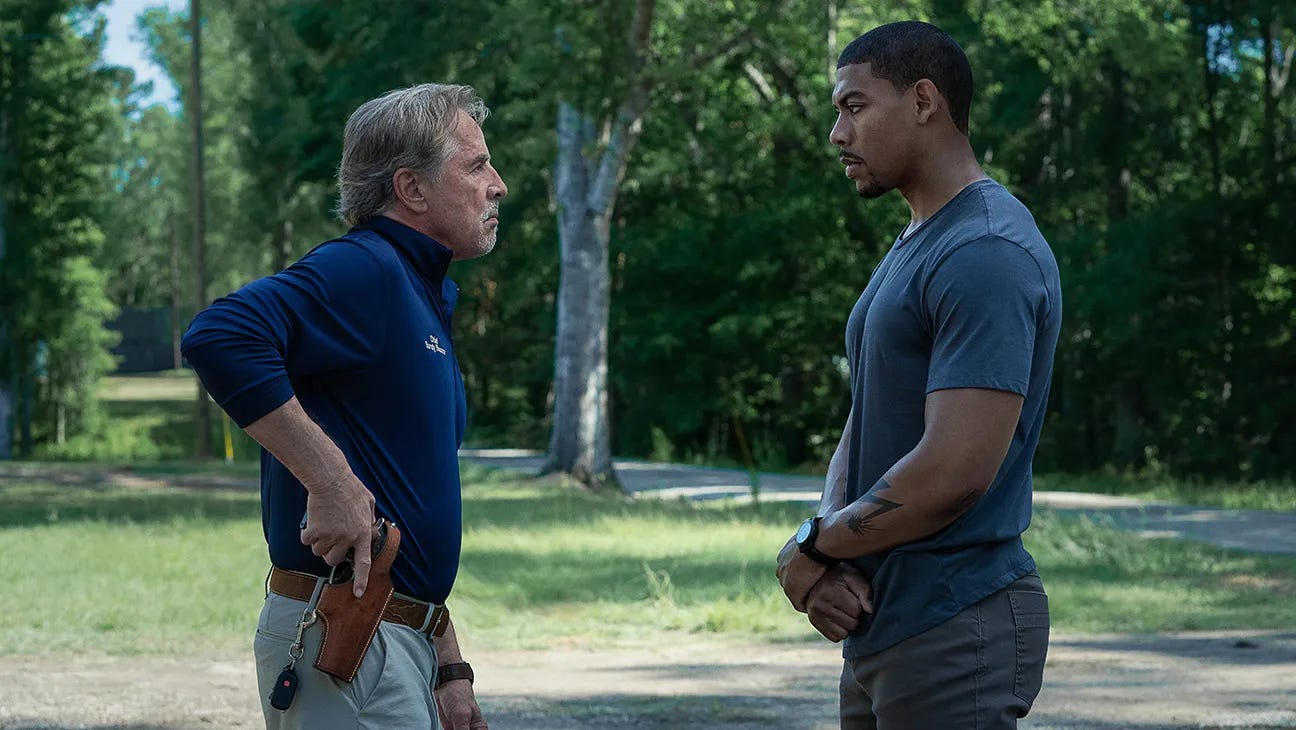In Review: 'Beetlejuice Beetlejuice,' 'Rebel Ridge'
In theaters: A long-in-the-works sequel to a Tim Burton favorite. At home: A taut, timely thriller from the director of 'Green Room.'
Beetlejuice Beetlejuice
Dir. Tim Burton
105 min.
What is Beetlejuice Beetlejuice about?
If you were to ask me that question in public, I might say “it’s about an hour and 45 minutes” and back away slowly, concerned that I might be pressed for more information. Because answering that question without the aid of multiple sources and/or a summary too convoluted for casual conversation is next to impossible. It’s been 36 years since director Tim Burton made the original Beetlejuice, only his second feature, and a few prominent members of the core cast have returned, too, namely Michael Keaton, Winona Ryder, Catherine O’Hara, and the memory of the mega-cancelled Jeffrey Jones. Yet it seems like the script, by Wednesday creators Alfred Gough and Miles Millar, has been adding bits of narrative scaffolding the entire time, like Philip Seymour Hoffman’s never-ending project in Synecdoche, New York. New characters arrive to the series, each with their own subplot safely stowed in the overhead compartment.
To be fair, it’s not as if the rules of Burton’s zany afterlife, with its crooked corridors and Harry Belafonte covers, were ever that easily understood, as evidenced by a thick tome entitled Handbook for the Recently Deceased. Yet Beetlejuice itself, a comedy about the recently deceased residents of an idyllic two-story in rural Connecticut, is pretty cut-and-dried: The newly dead couple wants to scare the noxious new owners of their house, so they call on the creepy “bio-exorcist” Beetlegeuse (Keaton) to help them do it. With that premise in place, Burton could put the emphasis on the afterlife as a purgatorial DMV and set Keaton loose as the foul, anarchic scamp triggering most of the laughs. The sequel is much more diffuse, larded up with additions that are nearly all subtractions, especially when they collide at once.
The decades have been unkind to Lydia Deetz (Ryder), whose ability to snuff out the supernatural has made her the host of a talk show called Ghost House, but chipped away at her sanity. When she gets news from her mother Delia (O’Hara) that her father (Jones, appearing in claymation form) has died a ridiculous death, Lydia and her unctuous producer/boyfriend Rory (Justin Theroux) head back to the house in Winter River, Connecticut for the funeral. Along the way, Lydia picks up her estranged daughter Astrid (Jenny Ortega), who naturally resents her freakish mom but slowly begins to realize that her psychic visions are legit. As Beetlegeuse awaits his inevitable call, he has to contend with his revivified, soul-sucking ex-wife (Monica Bellucci) and a ghost detective (Willem Dafoe) who was once a B-movie star.
Bringing a certified weirdo like Dafoe into the Beetlejuice world is a smart idea, given that even Dafoe’s human characters, like his mad scientist in Poor Things, often suggest the comically uncanny. But the screenwriters try to pack a TV season’s worth of incident into a setting that’s already too frantic to accommodate it. When three or four characters or subplots could be dropped without the film missing anything, that’s too much prime Winter River real estate to give away. The shame of it is that Keaton and Burton both seem up to the task, returning comfortably to an eccentric funhouse where they can run amok with quick one-liners and hand-crafted visual wonders. They’ve just invited too many guests. — Scott Tobias
Beetlejuice Beetlejuice arrives in theaters tonight.
Rebel Ridge
Dir. Jeremy Saulnier
131 min.
It doesn’t take long for Terry (Aaron Pierre) to realize he’s in trouble when he’s knocked off his bike, handcuffed, and questioned by a pair of cops from the small Louisiana town of Shelby Springs in the opening scene of Rebel Ridge. But it takes him a bit to realize just how much trouble. As a Black man living in the south, he understands the situation and, since he’s on a mission to retrieve a cousin given a suspiciously high bail for a misdemeanor marijuana possession charge, he already knows that Shelby Springs doesn’t play fair. He’s committed no crime but the stack of money in his backpack gives the cops all the excuse they need to impound the “suspicious” cash under the process of civil asset forfeiture, a real procedure whose many potential abuses writer and director Jeremy Saulnier (Green Room) gracefully incorporates into the plot.
That’s not the only part of this tense, smart, sharply staged thriller that draws from the blurry area between the letter and the spirit of the law. Though Terry’s soon released, he’s given little hope of retrieving his money or securing his cousin’s release before he’s transferred to a state facility. Returning the next day, Terry quickly finds that talking to Chief Burnne (Don Johnson, savoring a villainous role) won’t help him much either. Polite and soft-spoken, Terry’s easy to underestimate, particularly after Burnne and his officers learn that their victim’s military service didn’t include combat experience. But that doesn’t mean Terry’s not a fighter or a planner, skills that kick in instinctually as the situation intensifies.
After he partners with a sympathetic court clerk named Summer (AnnaSophia Robb), Terry’s journey doubles as a tour of police abuses in an age of police reform. Required to clean up his act a few years back, Chief Burnne has simply found new ways to take advantage of his position. Given an array of military-grade weapons and “less lethal” weapons but burdened with safety and accountability devices, his cops have learned how to take advantage of the former while neutralizing the latter. In the best sense possible, Saulnier’s latest often plays like First Blood crossbred with a Last Week Tonight with John Oliver segment.
Saulnier’s a gifted director of action scenes, a skilled orchestrator of plots that veer in unexpected directions, and he fills the film with memorable characters played by Johnson, Robb, James Cromwell, David Denman, and the rest of the cast (including Steve Zissis as a spectacularly unhelpful court employee). But it’s Pierre’s alternately despairing and wrathful performance that anchors the film. He depicts Terry as a man who’s learned to survive, remaining deferential if it means achieving his goal, but turning calculatedly aggressive when politeness stops working. (An actor probably best known outside Britain for The Underground Railroad, this should be a breakout film for Pierre.) Terry’s a formidable figure put up against a possibly overwhelmingly formidable foe: a system designed to exploit the easily exploitable that’s turned an American town into a plausibly Kafkaesque nightmare, with little suggestion that Shelby Springs is especially different from any other place he might go. —Keith Phipps
Rebel Ridge is now on Netflix.









Firsties!
Wanted to jump on here to echo Keith's endorsement of REBEL RIDGE, which I liked even more than he did. You just don't see genre filmmaking done with this level of old-school craft that often, and it feels so much like an updating-of/response-to films like FIRST BLOOD without skimping on the action.
Now that I've seen Rebel Ridge, yeah it's the First Blood-meets-Reacher movie we deserve. As a bicycle-supremacist, I don't think it's possible for a film to have more quickly made me sympathize with a protagonist than how this movie starts.